Your oil perfume's typical lifespan ranges from 12-18 months, though this varies based on ingredients and storage conditions. You'll get the longest life by keeping your perfume in dark glass bottles away from sunlight and heat, with citrus-based oils fading faster than floral blends. Watch for signs of expiration like sour odors, color changes, or separation. Understanding proper storage techniques and quality ingredients can greatly extend your perfume's prime performance.
Understanding the Shelf Life of Essential Oil Perfumes
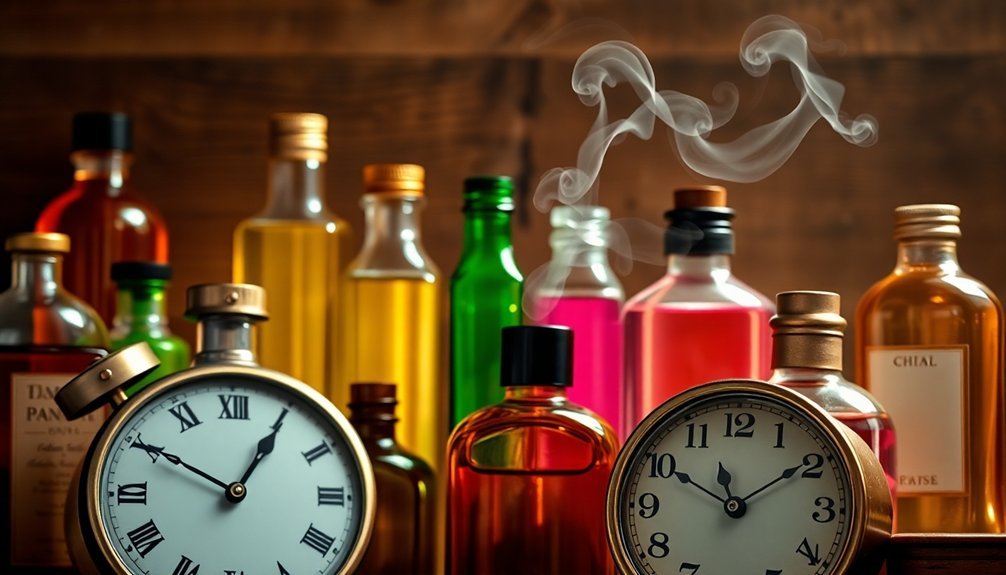
While essential oil perfumes can bring lasting fragrance to your daily life, their shelf life requires careful attention.
You'll find that most essential oil perfumes last just over a year, though their longevity varies based on the ingredients and storage conditions. Different fragrance families have distinct lifespans – citrus-based oils tend to fade faster than floral or chypre blends.
To maintain potency, you'll need to protect your perfumes from high temperatures and direct sunlight.
Watch for signs of expired essential oil perfumes, such as sour or metallic odors and color changes. You can extend your perfume's lifespan well beyond the average by storing it properly in dark glass bottles and keeping them in cool places.
This careful storage can help preserve your fragrances for several years.
Storage Conditions That Impact Perfume Oil Longevity
Your perfume oils will quickly deteriorate if you expose them to direct sunlight, as UV rays break down the fragrance compounds and alter their chemical composition.
To protect your investment, you'll want to store your oils in dark glass bottles that shield the contents from harmful light exposure.
Maintaining a steady, cool temperature is equally important, as heat fluctuations can cause your perfume oils to evaporate faster and lose their intended scent profile.
Light Exposure Effects
Light exposure poses one of the most significant threats to perfume oil longevity, as it triggers chemical reactions that degrade the fragrance compounds.
When you store your perfume oils in clear containers or leave them exposed to direct sunlight, you'll notice faster deterioration of their potency and quality. The UV rays can cause your fragrance to develop an unpleasant sour or metallic smell.
To maximize your perfume oil's shelf life, you'll want to keep it in dark glass bottles and store them in a cool, shaded location away from heat sources.
By protecting your oils from light exposure, you can extend their lifespan from just one year to several years.
Remember that proper storage isn't just about preserving the scent – it's about maintaining the overall integrity of your perfume investment.
Temperature Control Basics
Temperature plays an essential role in preserving the quality of your perfume oils, as even slight fluctuations can trigger chemical changes that affect their composition.
You'll want to guarantee proper temperature control by storing your fragrances in a cool environment, away from heat sources that can accelerate evaporation of the volatile compounds.
Your storage conditions directly impact your perfume oil's longevity. To maintain fragrance integrity, keep your oils in a consistently cool spot, like a drawer or cabinet away from windows and heating vents.
High temperatures don't just speed up oxidation; they can permanently alter your perfume's scent profile. For best results, store your oils in dark glass bottles with tight-fitting caps, and avoid areas prone to temperature fluctuations like bathrooms or windowsills.
These simple steps will help preserve your perfume's intended aroma for years.
Signs Your Oil Perfume Has Expired
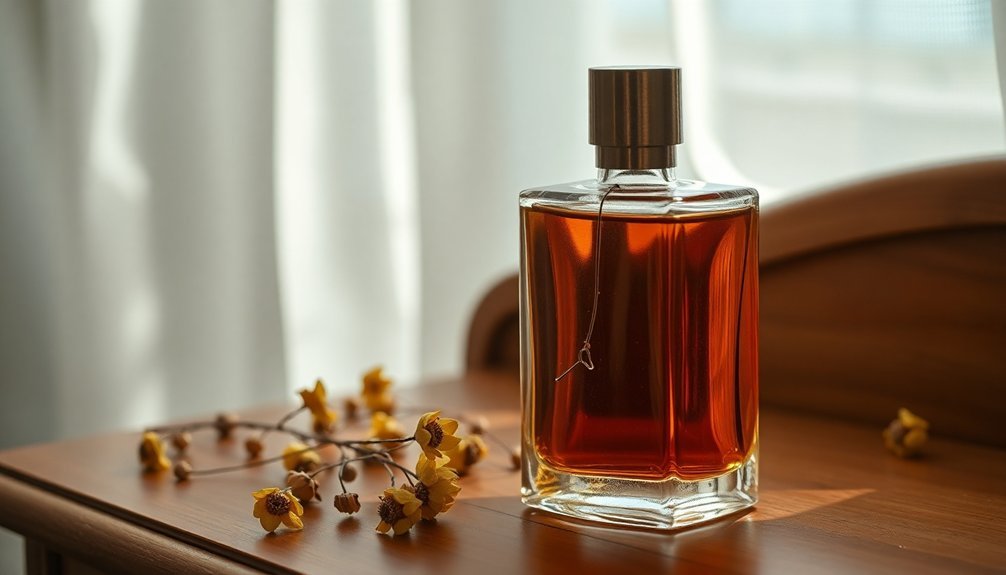
Your oil perfume's expiration becomes apparent through several key indicators.
If you notice your fragrance's color has changed or darkened, or the liquid appears separated instead of uniform, it's likely past its prime.
When the scent takes on a sour or metallic quality that's distinctly different from its original aroma, you'll want to replace your perfume oil immediately.
Color Changes Over Time
When examining your oil perfume's condition, a change in color often serves as the first warning sign of expiration.
You'll notice your fragrance may become darker or develop a cloudy appearance compared to its original state. These color changes over time directly indicate that your perfume's shelf life is nearing its end.
While quality ingredients can help extend your perfume's longevity beyond the typical one-year lifespan, it's crucial to monitor any discoloration regularly.
This is particularly important for citrus-based fragrances, which tend to deteriorate faster than floral or chypre scents.
If you spot significant color alterations alongside a sour or metallic smell, you're dealing with an expired perfume that's no longer suitable for use.
Regular visual inspections can help you maintain fresh, effective fragrances and know when it's time for replacement.
Scent Becomes Notably Different
One of the most reliable indicators that your oil perfume has expired comes from a distinct shift in its signature scent.
When your fragrance develops a sour or metallic undertone, it's a clear sign that the oil has deteriorated. You'll notice this change particularly in citrus-based perfumes, which tend to expire more quickly than their floral counterparts.
Proper storage plays a vital role in maintaining your oil's intended scent.
If you've exposed your perfume to high temperatures or direct sunlight, you might detect these unwanted scent changes sooner.
Watch out for any discoloration alongside these olfactory shifts – if your oil becomes darker or cloudy while smelling different, it's definitely time to replace it.
Remember that most oil perfumes last just over a year, even with ideal storage conditions.
Texture Appears More Separated
A telltale sign of expired oil perfume appears when the mixture starts to separate into distinct layers. When you notice changes in texture, it's likely that your fragrance has begun to oxidize, compromising its quality.
To maintain the integrity of your oil perfumes, proper storage is essential.
Here's what to watch for:
- Visible separation of oil components into distinct layers
- Changes in viscosity or unusual thickness
- Floating particles or debris in the mixture
- Uneven consistency when gently swirled
Even high-quality oil perfumes can experience these changes, typically after a year if not stored correctly.
To protect your fragrances, keep them in a cool, dark place away from direct light and heat.
When you spot these texture changes, it's time to think about replacing your oil perfume to guarantee the best scent experience.
Natural Vs Synthetic Oil Perfume Durability
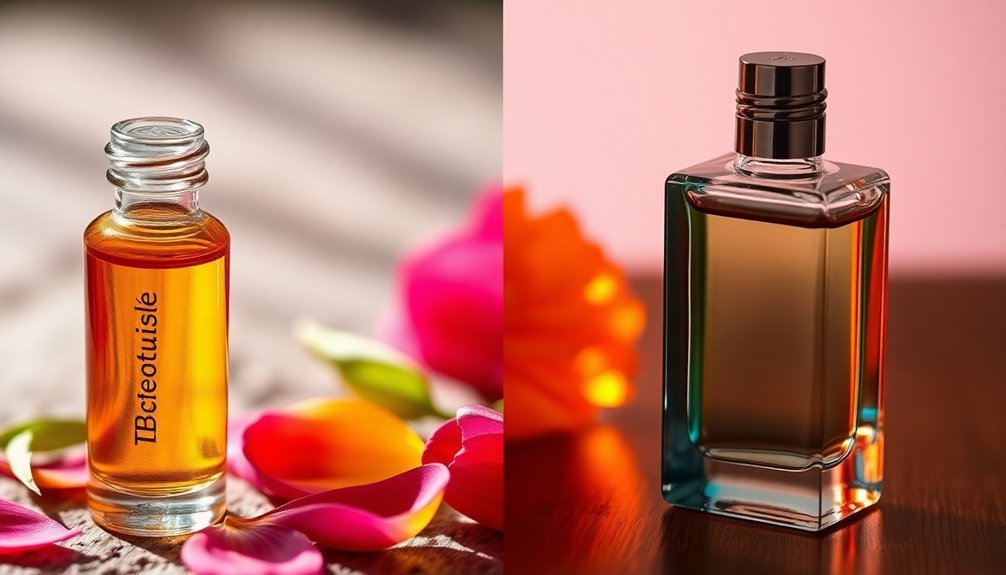
Since the debate between natural and synthetic oil perfumes continues to intrigue fragrance enthusiasts, understanding their durability differences is important.
Natural oils typically outlast their synthetic counterparts on your skin because they blend seamlessly with your unique body chemistry. However, don't dismiss synthetic fragrances too quickly – high-quality synthetics can match natural oils in longevity, especially when enhanced with stabilizers and fixatives.
The concentration of fragrance oils plays an essential role in how long your scent will last. Both natural and synthetic perfumes with higher concentrations deliver longer lasting scents.
To maximize the lifespan of either type, proper storage conditions are critical. Keep your oils in cool, dark places to prevent their fragrance compounds from breaking down, ensuring you'll enjoy their scents for an extended period.
Best Practices for Extending Oil Perfume Life
While proper application techniques matter, how you store and handle your oil perfumes ultimately determines their longevity. Your perfume oils last longer when you store them correctly and apply them strategically.
Keep your precious fragrances in dark glass bottles, safely tucked away in cool, dark spaces away from direct sunlight and heat exposure.
To maximize your perfume oils' lifespan and performance, follow these essential practices:
- Apply perfume oils to pulse points where body heat naturally activates and diffuses the scent
- Always keep bottles tightly sealed when not in use to prevent oxidation
- Layer your oils with unscented moisturizer, as hydrated skin retains fragrance better
- Regularly inspect your perfumes for any changes in color, consistency, or smell that might indicate expiration
The Science Behind Perfume Oil Degradation
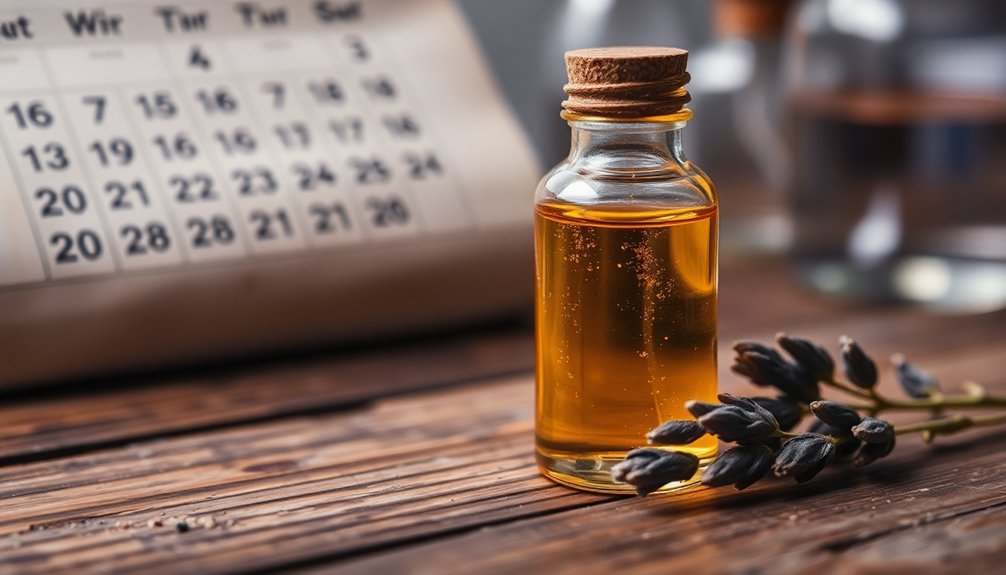
Understanding how perfume oils degrade reveals why proper storage and handling matter so much for preserving their quality. When you expose your perfume oils to common environmental factors, their chemical structure begins to break down, affecting both their potency and intended scent profile.
| Factor | Effect | Prevention |
|---|---|---|
| Light | Color changes | Store in dark bottles |
| Heat | Faster degradation | Keep in cool places |
| Air | Compound breakdown | Seal tightly |
While natural ingredients in perfume oils typically offer better skin adherence and stability, they're still susceptible to degradation over time. You'll notice your perfume oil's shelf life averages about one year, but you can extend this through proper storage techniques. Watch for signs like color changes or altered scents, which indicate your oil's compounds are breaking down and it's time for replacement.
Seasonal Effects on Oil Perfume Stability
As temperatures shift throughout the year, your oil perfumes respond differently to seasonal changes in both storage conditions and skin chemistry.
You'll notice that cooler temperatures help preserve your fragrances longer, while warm weather can speed up evaporation and affect their stability. Temperature fluctuations impact not only how long your perfume lasts but also how it interacts with your skin.
To maximize your oil perfume's longevity throughout different seasons:
- Keep bottles in a cool, dark place to prevent heat and light damage
- Expect stronger scent diffusion during humid summer months
- Anticipate faster absorption in dry winter conditions
- Monitor storage temperatures to maintain fragrance quality beyond one year
Understanding these seasonal effects helps you protect your perfumes and guarantee they perform consistently year-round.
Quality Ingredients and Their Impact on Lifespan
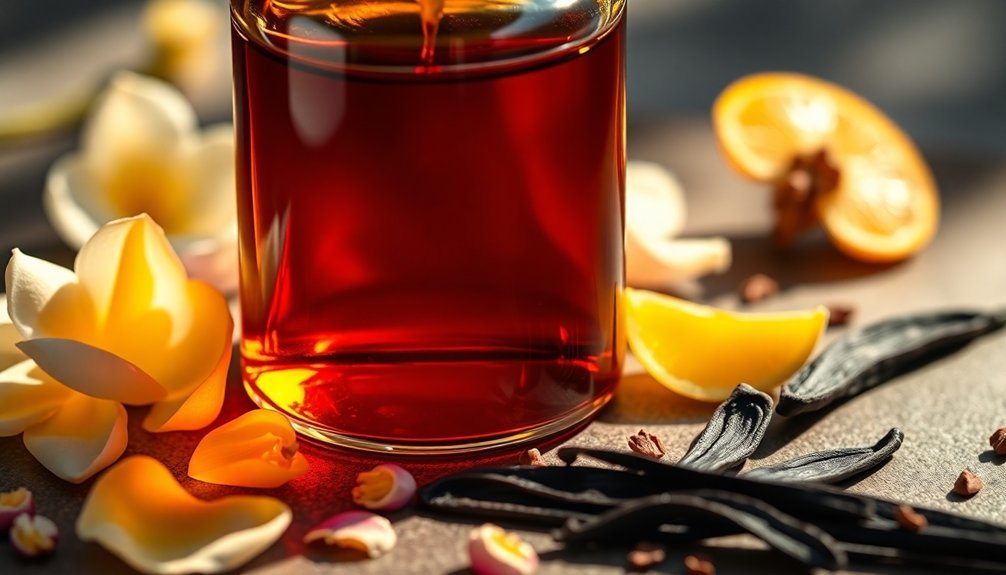
The ingredients in your oil perfume directly determine its lifespan and performance. When you choose perfumes with high-quality ingredients, you'll notice they stay longer on the skin, often lasting 6-12 hours or more.
Natural ingredients adhere better to your skin and resist evaporation, unlike their synthetic counterparts.
The quality of ingredients matters considerably because perfume oils can maintain their potency when they're highly concentrated, typically containing 20-30% fragrance oils.
Even if you have dry skin, premium natural oils will work with your body chemistry, creating an evolving scent throughout the day.
To maximize your perfume's lifespan, store it in a cool, dark place. This careful storage, combined with superior ingredients, guarantees your fragrance remains stable and enchanting for years.
Preserving Different Oil Perfume Formulations
When properly preserved, oil perfumes can maintain their enchanting aromas for several years beyond their standard shelf life.
You'll maximize their longevity by following specific storage and application techniques that protect their natural and synthetic components.
- Store your oil perfumes in dark glass bottles away from direct sunlight to prevent degradation of both natural and synthetic ingredients.
- Keep bottles tightly sealed when not in use to protect against oxidation, which can alter the fragrance's chemical composition.
- Apply to moisturized skin, particularly on pulse points like wrists and neck, to enhance the scent's intensity and staying power.
- Choose a cool, dark storage space to maintain the integrity of delicate ingredients, especially natural florals and woods that contribute to the perfume's distinctive character.
Frequently Asked Questions
How Long Do Oil Perfumes Last?
You'll find that oil perfumes last 6-12 hours on your skin, far longer than traditional spray fragrances. They'll stay fresh for about a year when stored properly, giving you extended wear with each application.
Can I Use 10 Year Old Perfume?
While you can technically use 10-year-old perfume, it's risky. You'll need to check for signs of spoilage like sour smells, discoloration, or texture changes. If it seems normal, test it on your skin first.
What Are the Disadvantages of Oil Based Perfume?
You'll find oil-based perfumes can stain clothes, don't project as strongly as sprays, and require direct skin contact. They're less convenient to apply, may cause skin reactions, and can leave an oily residue.
Do Perfume Oils Get Stronger Over Time?
No, your perfume oils won't necessarily get stronger over time. Instead, you'll notice they evolve and develop different notes as they interact with your skin chemistry. They may deepen, but won't increase in strength.
In Summary
You'll get 2-5 years from most oil perfumes when stored properly, but this timeline isn't set in stone. Keep your fragrances away from heat, light, and humidity to maximize their lifespan. Watch for changes in color, scent, or consistency as warning signs. While natural oils typically degrade faster than synthetic ones, proper storage and handling will help any perfume oil maintain its integrity longer.
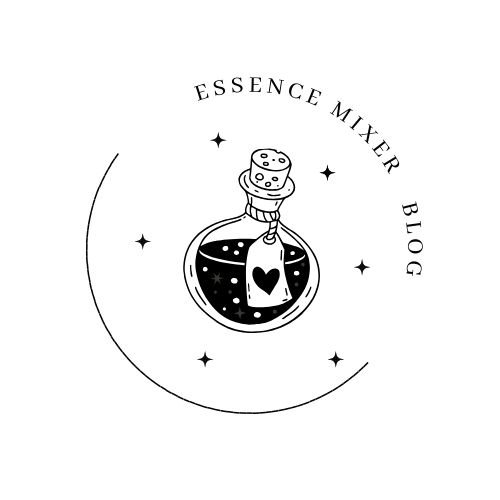
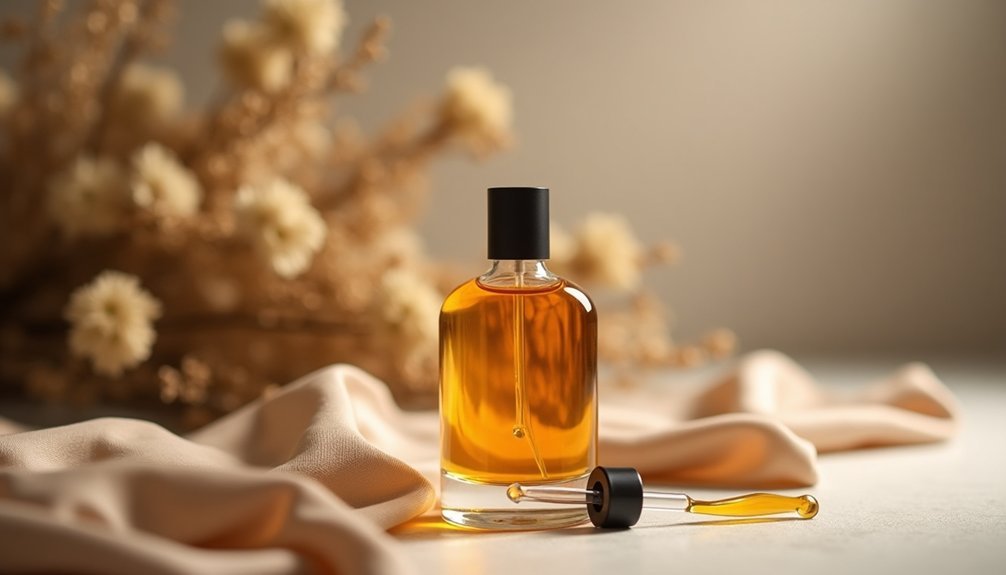



Leave a Reply